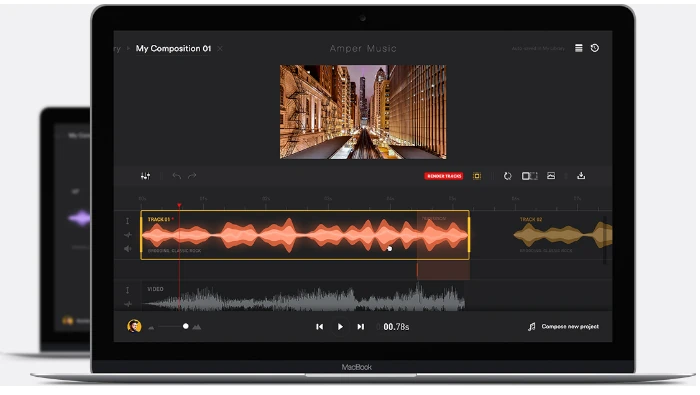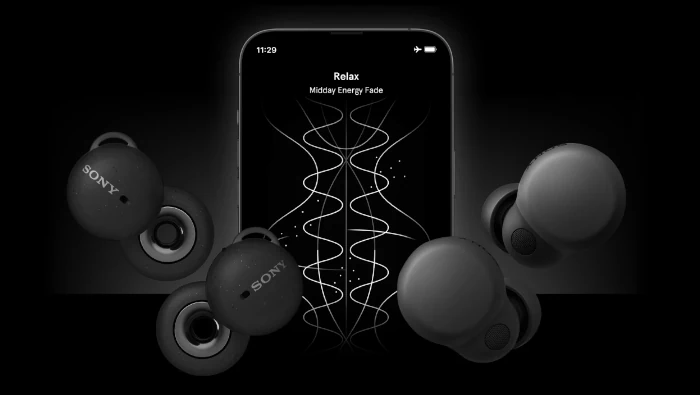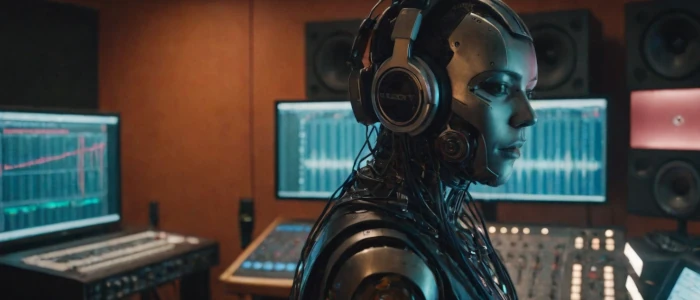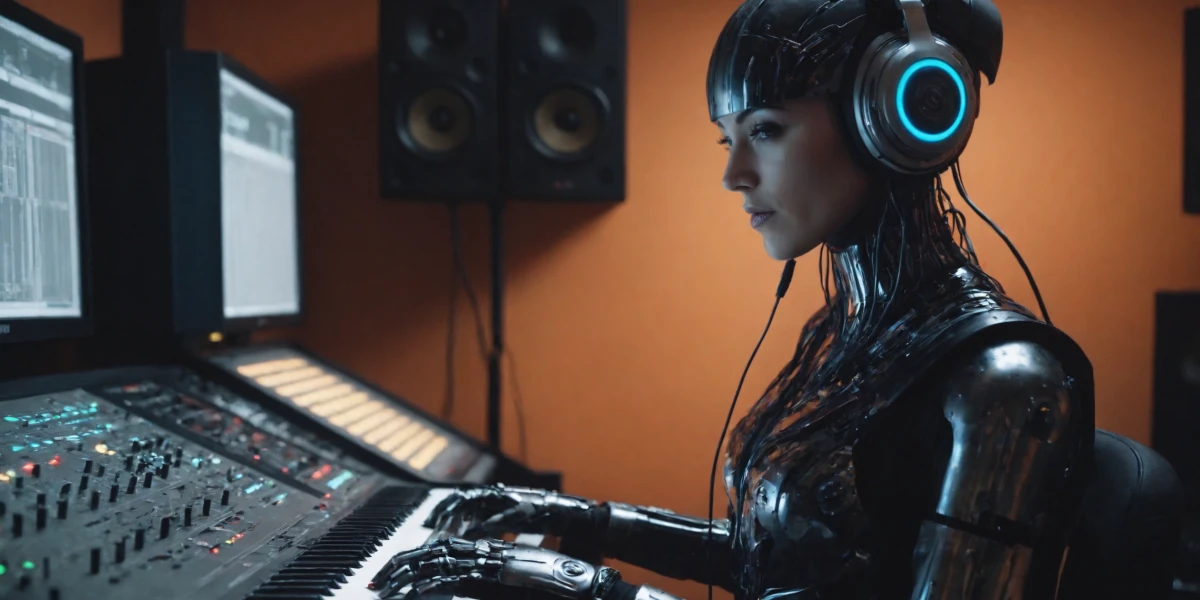Imagine a world where your favorite songs are not only written but also produced by artificial intelligence. This is not a scene from a sci-fi movie; it’s the present reality. AI is rapidly transforming various industries, and music production is no exception. According to recent studies, the global AI music market is projected to grow significantly in the coming years, underscoring its rising influence in the music world.
Artificial Intelligence (AI) has come a long way from its inception, and its integration into music production is a testament to its versatility. AI’s ability to analyze vast amounts of data, recognize patterns, and make predictions has opened new avenues for creativity and efficiency in music production. But this technological leap raises a pivotal question: Is AI a friend or foe to the music industry?
In this blog post, we will delve into the multifaceted role of AI in music production. We will explore how AI is revolutionizing the creation process, the benefits it brings, the challenges it poses, and the potential for a harmonious coexistence between AI and human creativity. From automating repetitive tasks to generating entirely new compositions, AI is pushing the boundaries of what is possible in music.
However, this advancement is not without its controversies. Critics argue that AI could undermine the human touch that makes music so deeply personal and emotive. There are also concerns about job displacement and the ethical implications of AI-generated music.
As we navigate through these topics, we aim to provide a balanced perspective on whether AI should be embraced as a valuable tool in music production or approached with caution. Join us on this journey to uncover the true impact of AI on the future of music.
The Benefits of AI in Music Production
AI technology offers numerous advantages in music production, revolutionizing how artists and producers create and refine their work. Here, we explore some of the key benefits that AI brings to the table, enhancing creativity, efficiency, and accessibility in the music industry.
Enhanced Creativity and Innovation
AI tools can generate fresh ideas by analyzing vast databases of musical compositions. By identifying patterns and styles, AI can suggest novel melodies, harmonies, and rhythms, providing musicians with unique inspirations that might otherwise go unexplored. This capability allows artists to experiment with new sounds and genres, fostering innovation and pushing the boundaries of traditional music creation.
Efficiency and Time-Saving
One of the most significant benefits of AI in music production is its ability to streamline workflows. AI-powered software can automate repetitive and time-consuming tasks such as editing, mixing, and mastering. For instance, AI can quickly identify and correct off-key notes, balance audio levels, and apply effects, saving producers countless hours. This efficiency enables musicians to focus more on the creative aspects of their work.
Accessibility for All Musicians
AI technology has democratized music production, making it accessible to a broader range of people. High-quality production tools that once required extensive knowledge and expensive equipment are now available to anyone with a computer and internet access. AI-driven platforms and apps allow amateur musicians to produce professional-sounding tracks, leveling the playing field and encouraging more diverse voices in the music industry.
Personalized Music Experiences
AI’s ability to analyze listener preferences has led to more personalized music experiences. Streaming services use AI algorithms to curate playlists and recommend songs based on individual tastes. This personalization not only enhances the listener’s experience but also helps artists reach a more targeted audience, increasing their chances of success.
Data-Driven Insights
AI provides valuable data-driven insights that can inform artistic and business decisions. By analyzing trends and audience feedback, AI can help musicians and producers understand what resonates with their listeners. These insights can guide marketing strategies, tour planning, and even future music projects, ensuring that artists stay relevant and connected with their fan base.
Collaboration and Co-Creation
AI can facilitate collaboration between artists by offering platforms for co-creation. Musicians from different parts of the world can collaborate in real-time, using AI tools to seamlessly integrate their contributions. This global collaboration can result in rich, multicultural musical pieces that reflect diverse influences and perspectives.
In conclusion, AI in music production brings a plethora of benefits that enhance creativity, efficiency, and accessibility. By leveraging AI technology, musicians and producers can unlock new potentials, experiment with innovative ideas, and reach wider audiences. As we embrace these advancements, the music industry is set to evolve in exciting and unprecedented ways.
Challenges and Concerns
Despite the numerous benefits AI brings to music production, it also presents several challenges and concerns that merit careful consideration. As AI technology continues to evolve, these issues become increasingly important for musicians, producers, and listeners alike.
Loss of Human Touch and Authenticity
One of the most prominent concerns about AI in music production is the potential loss of human touch and authenticity. Music is often seen as an expression of human emotion and experience, qualities that AI-generated music might lack. Critics argue that AI-produced tracks can feel mechanical and devoid of the soul that comes from a human artist’s personal touch and emotional input.
Creativity and Originality Concerns
While AI can generate new musical ideas, there is a debate about whether these creations can truly be considered original. AI relies on existing data to produce music, which means it draws from pre-existing compositions and patterns. This reliance raises questions about the originality of AI-generated music and the potential for it to become formulaic or derivative, rather than genuinely innovative.
Ethical and Copyright Issues
The use of AI in music production also brings up ethical and copyright concerns. AI systems often analyze and learn from vast amounts of existing music, which can include copyrighted material. This practice raises questions about intellectual property rights and whether AI-generated music could infringe on these rights. Additionally, there are ethical considerations regarding credit and compensation for AI-created works, especially when AI tools are used to replicate an artist’s style or voice.
Economic Impact on Musicians
AI’s efficiency and cost-effectiveness can have economic implications for human musicians and producers. As AI tools become more advanced and widespread, there is a concern that they could replace human roles in the music production process. This shift could lead to job displacement and reduced opportunities for aspiring musicians and producers, particularly those who rely on traditional methods and skills.
Bias in AI Algorithms
AI systems are only as good as the data they are trained on, which can sometimes include biases. If the training data reflects certain cultural, gender, or genre biases, the AI-generated music may perpetuate these biases, leading to a lack of diversity in musical outputs. Ensuring that AI systems are trained on diverse and representative data is crucial to mitigate this issue and promote inclusivity in music production.
Dependence on Technology
As AI becomes more integral to music production, there is a risk of over-reliance on technology. This dependence can stifle the development of traditional musical skills and creativity. Musicians and producers might become less inclined to experiment and innovate independently, potentially leading to a homogenization of music where human ingenuity takes a backseat to algorithmic efficiency.
In summary, while AI offers exciting possibilities for the future of music production, it is essential to address the challenges and concerns it presents. Balancing the benefits of AI with the preservation of human artistry, creativity, and ethical standards is crucial for the sustainable and harmonious integration of technology in the music industry.
Case Studies: Success Stories and Controversies
AI in music production has generated both remarkable success stories and heated controversies. Examining real-world examples provides insight into the practical applications and impacts of AI on the music industry.
Success Stories
1. Amper Music

Amper Music is a leading AI music composition platform that enables users to create original music in minutes. Artists and content creators worldwide have used Amper to produce background scores, jingles, and even full-length albums. Amper’s user-friendly interface and customizable options allow non-musicians to produce high-quality tracks, democratizing music production and empowering creativity.
2. Taryn Southern’s Album “I AM AI”

Singer-songwriter Taryn Southern made headlines with her album “I AM AI,” one of the first albums entirely composed with AI software. Southern collaborated with various AI tools, including Amper Music and IBM Watson, to create innovative and diverse tracks. The album showcases how AI can be a valuable creative partner, providing unique sounds and ideas that blend seamlessly with human artistry.
3. Endel

Endel is an AI-powered app that creates personalized soundscapes to improve focus, relaxation, and sleep. It uses algorithms to adapt to users’ environments and activities, offering a tailored auditory experience. Endel’s success highlights the potential of AI to enhance well-being through music, demonstrating a practical and beneficial application of technology in everyday life.
Controversies
1. Deepfake Music and Vocal Cloning
AI’s ability to clone voices and create deepfake music has sparked significant ethical concerns. In 2020, an AI-generated song featuring a deepfake of Jay-Z’s voice raised questions about consent and intellectual property. Critics argue that using AI to replicate artists’ voices without their permission is a violation of their rights and can lead to misuse and exploitation.
2. AI-Generated Music and Copyright Issues
The rise of AI-generated music has led to legal debates about copyright and ownership. In 2019, an AI-generated song titled “Daddy’s Car,” inspired by The Beatles, became the subject of controversy. While the song was not an exact copy, it raised questions about the originality of AI compositions and the potential for copyright infringement. Determining who holds the rights to AI-created music remains a complex legal challenge.
3. Obsolete Skills and Job Displacement
The increasing use of AI in music production has raised concerns about job displacement for musicians and producers. Traditional skills such as instrumental performance, sound engineering, and manual editing may become less valuable as AI tools automate these processes. Critics fear that this shift could lead to a decline in opportunities for human musicians and a loss of traditional musical craftsmanship.
In conclusion, the integration of AI in music production has led to significant advancements and successes, demonstrating the technology’s potential to enhance creativity and efficiency. However, it has also sparked controversies and ethical debates that cannot be ignored. Balancing innovation with respect for artistic integrity and legal standards is crucial as the music industry navigates this evolving landscape.
The Future of AI in Music Production

The future of AI in music production holds both exciting possibilities and complex challenges. As technology continues to advance, the music industry is poised for significant transformations. Here, we explore potential trends, innovations, and the evolving relationship between AI and human creativity.
AI as a Creative Collaborator
AI is likely to become an even more integral part of the creative process, acting as a collaborator rather than a replacement for human musicians. Future AI tools could provide real-time feedback and suggestions, enhancing the creative process. Musicians might use AI to explore new genres, experiment with unconventional sounds, and push the boundaries of traditional music composition.
Advanced Personalization and Interactivity
AI’s ability to analyze and respond to user preferences will lead to more personalized music experiences. Imagine AI-driven platforms that create customized soundtracks based on an individual’s mood, activity, or environment. Interactive music, where listeners can influence the composition in real-time, could become a popular trend, offering a dynamic and immersive auditory experience.
Integration with Augmented and Virtual Reality
The integration of AI with augmented reality (AR) and virtual reality (VR) technologies could revolutionize live performances and music education. AI can enhance AR/VR experiences by creating interactive and immersive musical environments. Musicians could perform in virtual spaces with AI-generated visuals and soundscapes, providing audiences with unique and engaging experiences. Additionally, AI-powered virtual tutors could offer personalized music lessons, adapting to the learner’s pace and style.
Enhanced Production Tools and Techniques
AI will continue to improve production tools, making them more sophisticated and user-friendly. Advanced algorithms could automate complex tasks such as audio mastering, sound design, and even lyrical composition, allowing producers to achieve professional results with minimal effort. These tools will be particularly beneficial for independent artists and small studios, leveling the playing field in the music industry.
Ethical and Regulatory Frameworks
As AI becomes more prevalent in music production, the need for ethical and regulatory frameworks will grow. Establishing guidelines for the use of AI in music, addressing issues such as copyright, ownership, and consent, will be crucial. The industry will need to balance technological innovation with respect for artists’ rights and creativity, ensuring that AI is used responsibly and ethically.
Collaboration Between AI Developers and Musicians
Future advancements in AI music production will likely result from close collaboration between AI developers and musicians. This partnership will help create tools that genuinely enhance the creative process and address the needs and concerns of artists. Musicians’ insights and feedback will be invaluable in developing AI systems that are intuitive, effective, and respectful of artistic integrity.
In summary, the future of AI in music production promises a dynamic and innovative landscape. While the potential for enhanced creativity, personalization, and efficiency is immense, it is essential to navigate the accompanying ethical and practical challenges thoughtfully. By embracing AI as a creative collaborator and developing robust regulatory frameworks, the music industry can harness the full potential of AI while preserving the essence of human artistry.
Conclusion: Balancing Innovation and Tradition
As AI continues to revolutionize music production, striking a balance between innovation and tradition becomes essential. The integration of AI offers unprecedented opportunities for creativity, efficiency, and accessibility, yet it also poses challenges that must be thoughtfully addressed.
Embracing AI’s Creative Potential
AI has demonstrated its ability to enhance the creative process, offering new tools and perspectives that can inspire musicians to push their boundaries. By leveraging AI, artists can experiment with novel sounds and compositions, tapping into a wealth of data-driven insights and generative capabilities. This collaboration between human creativity and machine intelligence can lead to groundbreaking musical innovations.
Preserving the Human Touch
Despite the advantages of AI, the unique emotional depth and authenticity that human musicians bring to their art are irreplaceable. Music has always been a reflection of human experiences, emotions, and cultural contexts. Ensuring that AI complements rather than replaces human input is crucial for maintaining the soul of music. Artists must retain their creative autonomy, using AI as a tool to enhance rather than dictate their artistic vision.
Navigating Ethical and Legal Landscapes
The rise of AI in music production necessitates the establishment of robust ethical and legal frameworks. Issues such as copyright, intellectual property, and the ethical use of AI-generated content must be addressed to protect the rights of artists and creators. Industry stakeholders, including musicians, producers, and AI developers, must collaborate to create guidelines that ensure responsible and fair use of AI technologies.
Fostering Collaboration and Inclusivity
AI can democratize music production by making high-quality tools accessible to a broader audience. This inclusivity fosters a more diverse and vibrant music landscape, where talent and creativity are not limited by technical skills or financial resources. Encouraging collaboration between AI developers and musicians will lead to the creation of intuitive and effective tools that serve the needs of artists across all levels.
Adapting to a Changing Industry
The music industry must adapt to the evolving landscape brought about by AI advancements. Embracing change while honoring tradition will be key to navigating this transformation. Artists, producers, and industry professionals must stay informed about technological developments and be open to experimenting with new methods. At the same time, they should continue to value and cultivate traditional musical skills and knowledge.
Looking Ahead
The future of music production lies in harmonizing the innovative power of AI with the timeless essence of human creativity. By embracing AI as a collaborative partner and addressing the associated challenges with care and foresight, the music industry can usher in a new era of artistic expression. This balance will ensure that music remains a deeply personal and culturally significant form of art, enriched by the possibilities that technology offers.
In conclusion, the journey of integrating AI into music production is both exciting and complex. As we navigate this path, it is crucial to maintain a thoughtful approach that respects the heritage of music while embracing the transformative potential of AI. By finding the right balance, we can create a future where innovation and tradition coexist harmoniously, enriching the musical landscape for generations to come.

